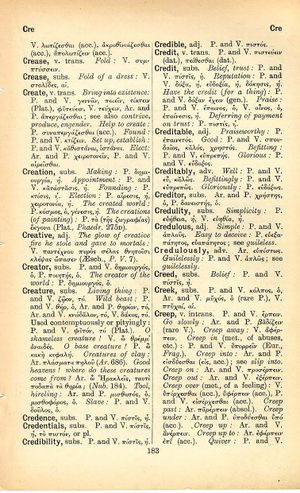creep: Difference between revisions
From LSJ
Θεὸς πέφυκεν, ὅστις οὐδὲν δρᾷ κακόν → Deus est, qui nihil admisit umquam in se mali → Es ist ein göttlich Wesen, wer nichts Schlechtes tut
m (Woodhouse1 replacement) |
mNo edit summary |
||
| Line 29: | Line 29: | ||
[[quiver]]: [[prose|P.]] and [[verse|V.]] [[τρέμειν]]. | [[quiver]]: [[prose|P.]] and [[verse|V.]] [[τρέμειν]]. | ||
[[creeping thing]], subs.: [[prose|P.]] and [[verse|V.]] [[ | [[creeping thing]], subs.: [[prose|P.]] and [[verse|V.]] [[ἑρπετόν]], τό ([[Xenophon|Xen.]], also [[Aristophanes|Ar.]]). | ||
}} | }} | ||
Revision as of 14:58, 26 June 2020
English > Greek (Woodhouse)
verb intransitive
go slowly: Ar. and P. βαδίζειν (rare V.).
creep in (Met., of abuses, etc.); P. and V. ὑπορρεῖν (Eur., Fragment).
creep into: Ar. and P. εἰσδύεσθαι (εἰς, acc.); see slip into.
creep on: Ar. and V. προσέρπειν.
creep out: Ar. and V. ἐξέρπειν.
creep over (Met., of a feeling): V. ὑπέρχεσθαι (acc.), ὑφέρπειν (acc.), P. and V. εἰσέρχεσθαι (acc.).
creep past: Ar. παρέρπειν (absol.).
creep under: Ar. and P. ὑποδύεσθαι ὑπό (acc).
creep up: Ar. and V. ἀνέρπειν.
creep up to: Ar. ἐφέρπειν ἐπί (acc.).
creeping thing, subs.: P. and V. ἑρπετόν, τό (Xen., also Ar.).

